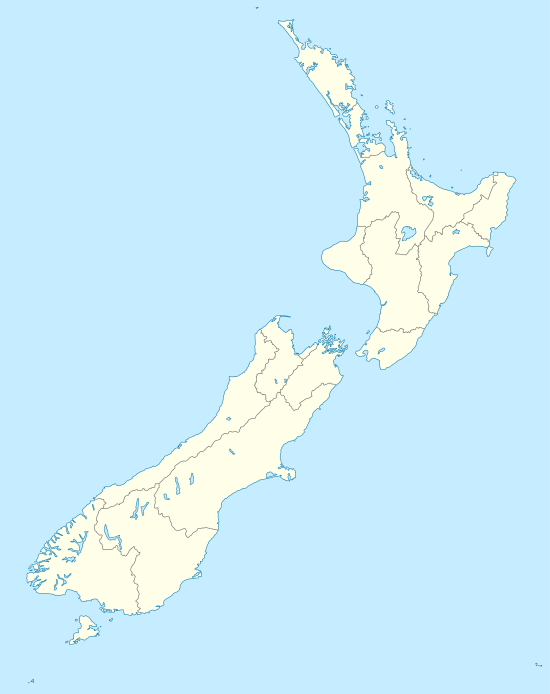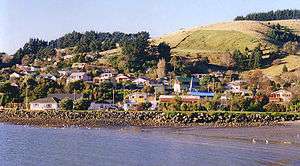Macandrew Bay
Macandrew Bay (Māori: Te Roto Pāteke) is located on the Otago Peninsula in the South Island of New Zealand. It is situated on the edge of Otago Harbour, and is named for pioneer European settler James Macandrew who lived here during his later life. The Te Reo Māori name for the bay, Te Roto Pāteke, refers to the Brown teal (Māori: Pāteke) formerly prevalent in the area.[1] Early European residents of the area called the bay "The Hundreds", due to the large number of boulders which covered the foreshore.[2]

Macandrew Bay is a suburb of Dunedin, but has the feel of an isolated coastal settlement and is often regarded as a separate township, even though the heart of the city is visible 10 kilometres away at the head of the harbour. It is both a commuter and a harbourside retreat from the city. Macandrew Bay's 2001 population was 1131.
.jpg)
The settlement centres on an area around the junction of Portobello Road and Greenacres Street, the latter a narrow road which rises steeply towards the interior of the Peninsula. Greenacres Street roughly follows the valley of the small Rodgers Creek. The community hall lies on the lower part of Greenacres Street close to its junction with Portobello Road, and the settlement's few shops lie immediately to the southwest of the junction. Behind these shops lie the community's primary school and cemetery, the latter of which includes the grave of James Macandrew.
The bay has a small beach opposite the shops, which is well-used by the public. The beach was created artificially, with sand brought to the bay from the nearby Pacific coast. The area around the beach has been turned into a small public park, and landscaping of this was completed in 1979.[3]
Macandrew Bay is the largest of several settlements which lie on the harbour coast of Otago Peninsula. Between it and Dunedin lies Glenfalloch, a private gardens open to the public.
Beyond Macandrew Bay to the northeast lie Company Bay and Raynbirds Bay and to the southwest is Colinswood, the latter named for James Macandrew's house. These small settlements could be considered "suburbs" of Macandrew Bay. Beyond Raynbirds Bay lie Broad Bay and Portobello. These settlements are connected to each other and to Dunedin's city centre by Portobello Road, a winding road which runs along the harbour coast of the peninsula.[4] Both the road and the sea wall which lies along the harbour edge were constructed by prison labour in the 1860s.[5]

A second route, Castlewood Road, rises from Company Bay to meet with Highcliff Road, which runs along the ridge of the peninsula from Dunedin to Portobello. Castlewood Road also connects with Camp Road, which lead to the stately home Larnach Castle, situated above Broad Bay.[3]
References
- Otago Daily Times, Waterways of the area, April 4, 2016.
- Reed, A. W. (1975). Place names of New Zealand. Wellington: A. H. & A. W. Reed. ISBN 0-589-00933-8.
- Hamel, A. (2008) Dunedin tracks and trails. Dunedin: Silver Peaks Press. pp. 4.05-06
- New Zealand Automobile Association. Greater Dunedin and Invercargill Street Directory, 1998 edition.
- New Zealand Automobile Association (1987). Guide to day tours in New Zealand. Sydney: Weldon Publishing. p. 157.